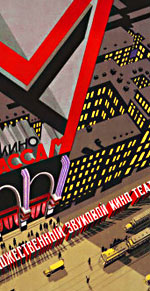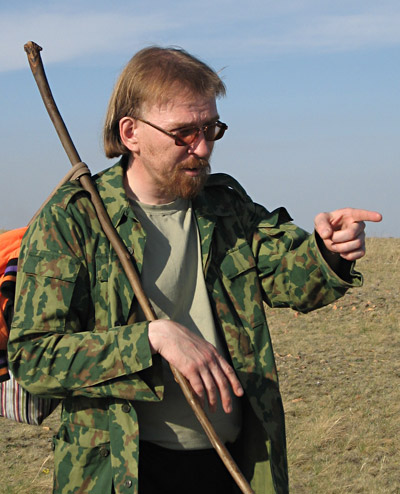
| Jacket 36 — Late 2008 | Jacket 36 Contents page | Jacket Homepage | Search Jacket |
This piece is about 7 printed pages long. It is copyright © Sergei Kruglov and Vitaly Chernetsky and Jacket magazine 2008. See our [»»] Copyright notice. The Internet address of this page is http://jacketmagazine.com/36/rus-kruglov-trb-chernetsky.shtml

Back to the Russian poetry Contents list
* * *
Spending identically-faced July days in an out-of-the-way small town in Eastern Siberia where the concrete of apartment blocks has gone to sleep before finishing screwing a forty-five-year-old peasant crone sated on macaroni; conducting daily life and love among the meager monotonously moving torture instruments of summer; in this small town close to the imaginary center of the world, in the wind that moves the dust but not the air, in the dusk and rot — for where else it’s as dark as in the circle at the candle’s center; in this arrangement of sewage, middlebrow taste, flies, useless chores and petty hooliganism; in the town of non-splendor and unfinished sounds, the lowest kind of materialism, the spiritual homeland of the blazer-clad fans of Nekrasov and cheep candy without wrappers, in the Babylon of non-poetry that reaches the limits of nonexistence; in the point not marked in the guidebooks either to Heaven or to Hell (let alone the middle spheres), in the town forgotten by war and enlightenment, where there lives a messiah who speaks on local TV and suffers from enlarged adenoids; where everything is squalid, sweaty, insufficient, and merciless; where rotting sparrow creeks burst their banks every now and then, bringing destruction to outhouses, vegetable gardens, and rat holes, bringing as well signs of dysentery and cholera; here where once upon a time, so long ago that it’s as if it never happened, the camels of Silk Road caravans broke their legs, and the descendants of pagan gods, famous tribes of witch doctors and blacksmiths, went extinct from alcoholism and diarrhea, and these days the hills of iniquitous suburban hillocks built up by human excrement grow monster-sized tomatoes nourished by the radiation from the surrounding valleys; where public transportation is more ghostly than Fata Mograna and the dry squares, indifferent poplars, and mongrel architecture spill out in all directions in front of one’s gaze, for the seams of this reality have long worn out; at the center of the region where the events from Europe and Asia arrive a full month later as big news, and the news never arrive at all, where fads for dance styles of both Americas die like poisoned rats that have made only halfway towards the water; in this place, or time, or consciousness, or another dimension of Being inaccessible to genius, living, going on living here despite it all! — I rise every evening while there is still light. I open the curtains, let in the setting of the ubiquitous local sun, make tea; and I wait; and I hope, I hope. My summer vacation buddy, Thomas à Kempis, has long been sitting at the table: he is quiet and serious, he is working — writing his book, on and on, studiously and silently, blinking occasionally, his left index finger against his temple. “You still writing!” — he looks at me disapprovingly and keeps on compiling his imitative book, tense in his imitation, resembling if not a monkey then a cat pregnant with monkeys. He sips the cooling Georgian tea[1] that I have served him — superior class, the one that smells like sausage! even he wouldn’t touch the 1st and 2nd class teas, abundant in the local colonial shop and smelling like a bachelor’s sock — he wouldn’t, no matter how hard I try — and in a tinkling voice of a mentor and an old sworn friend he inquires, “And so? is this life of yours not a crime and a denial of God?” “No!” I exclaim. “This life of yours , and this, this all — it’s not a crime, far from it! it is an illness–and this, and not! this is a misfortune, a dark hallucination, a pestilence, a greensickness that resembles a toothache, caries, pediculosis, composing verses for an anniversary, leprosy, canine distemper; in the geography of heaven and earth this life and this place is a July forever rotting between the Lord God’s buttocks — and He is too lazy to look at it in the mirror! and you, my friend — go on, keep writing.” He purses his lips, turns away and again squeaks with his pen, blinking, while I go out on the front porch, trying to recall the dream of the previous day, light up the night’s first cigarette and still holding out hope: what is there, in the ochre of the evening sky? could it be a storm cloud? perhaps it is a storm cloud; perhaps lightning will illuminate our garden overgrown with burdocks and tin cans, perhaps a thunderous voice from heavens will say that everyone is forgiven, and it is safe to go back home; perhaps! and a shower, a thundershower will pour down on us, frightening, joyous, tearful shower of our Lord will pour down on us, on the garden, on the small town, on this multiplying, oozing greenish quivering July — a purifying, disinfecting rain of insecticide and chlorine, fire and brimstone.
BRUNO SCHULZ
The sun outside the window, a redhead lilith
Laughing, devoured the names of the three angels.
But I’m but a child, and I won’t get scared,
Father! I’ll draw her,
An incantation: pencil, paper.
On a metallic branch outside the window sits that Stymphalian bird
The spring of 1942
Filled with melancholy yearning, begging for flesh
You know, father, if God really is
A rabbi from Drohobycz — then we are done for!
But if He is just G-d,
With the bleeding meaty emptiness of “o” (as if
They tore out, clinging tightly with crooked fingers
Eight pages right from the very middle
Of the dense, piquant, quivering moist-rose-like
Book) — then
It’s all right, perhaps we’ll somehow come back to life.
NATHAN AND THE ELECTIONS OF THE RULER
The elections are near.
In the last three days of February
The Orthodox Christians subject to the strictest fasting
Themselves, their pets, farm animals, cars, and all their household appliances,
Embarking on a joint prayer
For Russia to be granted an Orthodox tsar.
In the very same days
The monks in Buryat datsans
Also begin their prayers
For Russia to be granted a Buddhist tsar.
The sorrowful Adventists
Also gather these days at their prayer houses
They sing their soul-stirring hymns
On the melodies by Ian Frenkel and Yuri Antonov[2]
About the granting of whatever tsar, as long as
He moves the day off from Sunday to Saturday.
The Muslims are also not idling:
They offer their assiduous prayers
To the Most Righteous One
About the granting of a tsar who’d be circumcised, sober,
Who’d hate lard with garlic, and who’d right away
Declare the writer Elena Chudinova[3]
Wanted by the Russian police.
The last four observant Jews
Left in Russia
Also go to the synagogue.
They are no longer sure what to ask for. But just in case
They begin their prayers as well.
The smoke of prayers
Rising here and there over Russia!
Crawling, blending into a dark storm cloud,
They sprout lightning, they thunder, they howl fearsomely
Clash powerfully —
What a battle of prayers raging
Above the country! How it swirls,
No worse than the sparkling juicy battles of Uccello!
No, the Lord sighs bitterly, the analogy with a painting is inappropriate —
These are real people after all,
Here they squabble in such a non-picturesque fashion,
Pushing each other aside, trying to climb closer to Me,
Heads and hands seething
In the cauldron of this perpetually boiling country!
But what if I grant their wishes,
Give them a tsar, one for all, so that
He’d rule over them this way and that way, separately and all at once
Be their sail and rudder, their great helmsman,
The best friend of the Orthodox Christians
The best friend of the Baptists
The best friend of the oligarchs, skinheads, housewives,
Alcoholics, anonymous and not, and all the others — but no!
I won’t continue!
Wasn’t it not long ago that they had one just like that: merely recalling him
Makes you shudder.
And so? What conclusions? It’s as if
They have no memory, no brains, no heart!
Yet I do feel sorry for them — oh what should I do with them!
Thus He sits above Russia
Holding His indescribable head in his hands
Looking ahead in exhaustion.
Fr. Nathan alone
These days did not pray about anything of the kind:
The raging thaw melted the snow, the dirt,
Released multitudes of viruses,
And all these days the priest languished in his bed
Tormented by strong sore throat, with his favorite book, old and ragged, in his hands,
Having completely lost his voice —
And March began its radiance, got closer to the windows,
Rustled the dreams like gauze curtains —
Fr. Nathan was sick, he even
Forgot to cross his mug of herbal tea.
God, as one would expect, was grateful to him for this,
In difference from the parish warden and the parish women
Who sympathized with their priest, but as it were through clenched teeth:
In their unshakable tin-like imagination
The priest can neither get sick not commit a sin.
[1] (All notes are translator’s.) Tea from Georgia was the only one widely available in stores in Soviet days, especially in the times of shortages. Due to the inadequacy of Soviet economy its quality was usually really poor. The Georgian tea sold in Soviet stores had four different brands: Extra Class (the only drinkable one); Superior Class; First Class; and Second Class.
[2] Soviet pop-music composers active in the 1970s–1980s.
[3] Elena Chudinova, a Russian writer known for her dystopian pulp novel The Notre Dame de Paris Mosque (Mechet’ Parizhskoi Bogomateri, 2005), widely criticized for its anti-Muslim bias.

Sergei Kruglov
Sergei Kruglov(b. 1966) studied journalism at Krasnoyarsk University, and worked as a reporter for the local newspaper in Minusinsk. In 1999 he was ordained as a priest of the Russian Orthodox Church. He has published three books of poetry, one of which was shortlisted for the Andrei Bely Prize.